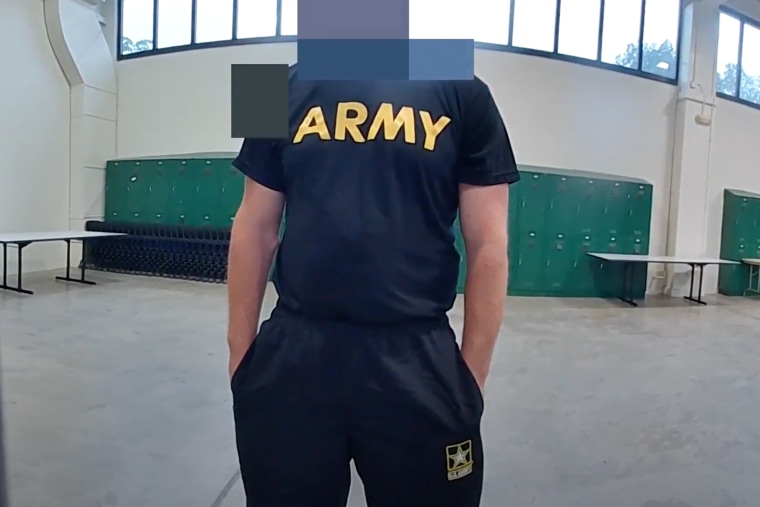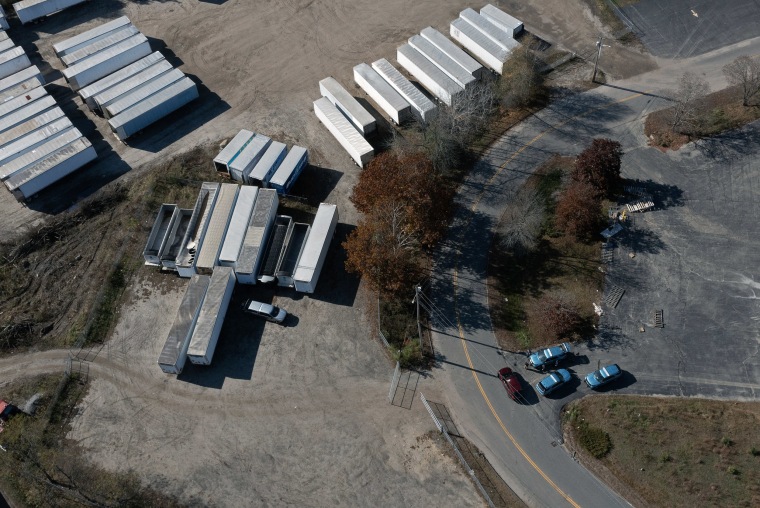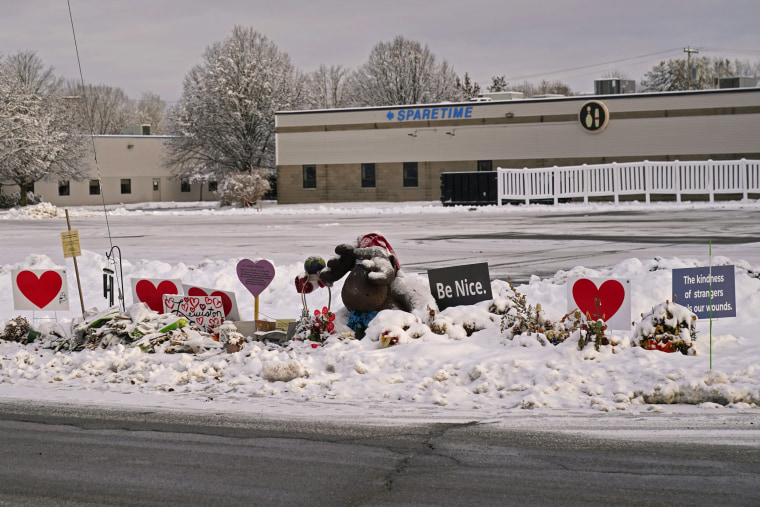[ad_1]
A fellow U.S. Army reservist interviewed by police about the Lewiston, Maine, mass shooter the month prior to the attack downplayed warnings about him, body camera recordings show.
The Sept. 16 footage, which captured audio but blurred the face of the reservist, identified in a private Maine lawyer’s report to a local sheriff’s office as Capt. Jeremy Reamer, was released Saturday by police in Saco, Maine, where the reserve base is located, following a Freedom of Information Act request filed by NBC News.
The officers, identified in that lawyer’s review of the Sagadahoc County Sheriff’s Office as Saco Police Department officers Rodney Rossignol and Amber Damon, told Reamer that Robert Card, 40, may have wanted to open fire at the base and that they were on the lookout for two vehicle license plates connected to Card.
Law enforcement found Card’s body with a self-inflicted gunshot wound near the Androscoggin River in Lisbon Falls on Oct. 27, two days after he allegedly killed 18 people at two businesses in Lewiston. The attack is the deadliest mass shooting in Maine’s history.
Reamer told the two officers that Card “never made any specific threats” and that base officials at National Guard Base in Saco, where the bodycam recordings took place, were “not expecting him to be here.”
He also said the soldier who initially reported concerns about Card “is not the most credible.” But, in regards to Card, Reamer said, “He did say he would shoot places, but didn’t say here,” according to the recordings.
He said he spoke on the phone with Card the previous day, when Card expressed anger over those in his unit who reported his erratic behavior in the summer. The reporting prompted New York State Police to take him to Keller Army Community Hospital at the U.S. Military Academy for evaluation in July, a Defense Department official said.

The officers conducting the less than 5-minute interview asked the captain, identified in the report to the sheriff as the commander of Card’s company, if they should continue to stake out his home to keep an eye on him. “I don’t see that we need to tie you guys up,” Reamer responded.
If the shooter arrived at the base with violent intentions, Reamer said, “We will do our best to kind of deescalate, handle it, on our end.”
“He’s not supposed to be here,” he said.
The captain said a number of area police officers were also U.S. Army soldiers at the base.
About three hours after speaking with the Saco Police Department officers, Reamer was on the phone with a Sagadahoc County Sheriff’s Office sergeant. According to a transcript of the 8-minute-long call, the sergeant told Reamer that “we’re very concerned over this” and that he had “a lot of documentation that said to me they’re worried about (Card) doing a mass shooting,” and that Card had been having hallucinations.
During the call, Reamer told the sergeant that he didn’t know the “validity” of a text message sent by the soldier who reported being concerned that Card was “going to snap and do a mass shooting.” Reamer said a text of that nature needs to be taken “very seriously,” but also that it should be taken with “a grain of salt as well.”
The characterization of Reamer’s actions in the Maine lawyer’s review reflected what was seen on the recordings reviewed by NBC News, saying Reamer told the two officers that “there was no need for the Saco Police to continue its protective detail at the Reserve Center, noting that the Saco Police would be called if any assistance became necessary. Accordingly, the Saco Police Department discontinued the protective detail around the Reserve Center.”
Reamer did not immediately respond to a request for comment.
The review’s author, lawyer Michael A. Cunniff, is a former U.S. Drug Enforcement Administration supervisory special agent who worked with police and deputies across Maine on narcotics task forces. In an email, he said he has never worked with the Sagadahoc County sheriff, Joel A. Merry, and said his office “retained me to conduct an objective review of (its) response to concerns about the mental health of Robert Card.”
Though he was paid by Sagadahoc County government to conduct the review, Cunniff said, “I had a duty to remain independent of, not dependent on, the county.”
Cunniff’s review of the Sagadahoc County Sheriff’s Office’s response to concerns around Card’s mental health said an officer with another police department in the region told police looking into the threat posed by Card that Card was not allowed to handle weapons on-base.
The review stated that the deputies did their duty when they twice tried to contact Card but failed, concluding that they had no grounds to detain him, commit him, or take his weapons. It said deputies relied on family members who said they would confiscate his weapons that September.
Law enforcement who conducted two searches for the shooter on Oct. 26 failed to check a parking lot at the recycling facility where he once worked and was believed to have possibly sought refuge, officials acknowledged at the time.
His body was found the next day in a box trailer in that parking lot after the facility’s owner told officers the lot stored the trailers and could provide a good hiding spot.

Maine enacted a “yellow flag” law in 2019 that allows authorities to confiscate weapons from those believed to be at risk of immediate violence, but critics say it requires a number of steps — family reporting, law enforcement contact, medical evaluation — that render it difficult to implement in real-world conditions.
In an email, sheriff Merry said that in order to trigger the yellow flag process, a person has to be taken into protective custody. The deputies who tried to contact Card were not able to take him into custody because he “refused to speak with the deputies or make himself available,” Merry said.
Democratic Gov. Janet Mills and Attorney General Aaron Frey launched what they described as an independent commission that will review events leading to the Lewiston attack.
U.S. Army Under Secretary Gabe Camarillo said in a recent letter to U.S. Sen. Susan Collins, R-Maine, that he was requesting the Army Inspector General launch an investigation into how the U.S. Army Reserve handled warnings about the shooter.
U.S. Army Public Affairs did not immediately issue a statement.

[ad_2]
Source link
